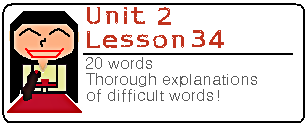 Lesson 34: In this lesson, you will learn some difficult words and concepts in Korean that I couldn’t fit into any particular lesson. Specifically, you will learn how to to use: 자기/자신, 훨씬, 관하다/관련하다, 주위, 일단, 전혀/별로, words dealing with weight, and words ending in ~거리다. Lesson 34: In this lesson, you will learn some difficult words and concepts in Korean that I couldn’t fit into any particular lesson. Specifically, you will learn how to to use: 자기/자신, 훨씬, 관하다/관련하다, 주위, 일단, 전혀/별로, words dealing with weight, and words ending in ~거리다.
This Lesson is also available in Español, Русский, Deutsch, 中文 and العربية |
 Lesson 35: In this lesson, you will learn how to use the common Korean ending of ~ㄹ 것 같다. You can use this ending to express “this MIGHT be/this SEEMS to be.” In addition, you will learn how to use this ending with the common phrase “그럴 것 같다.” Lesson 35: In this lesson, you will learn how to use the common Korean ending of ~ㄹ 것 같다. You can use this ending to express “this MIGHT be/this SEEMS to be.” In addition, you will learn how to use this ending with the common phrase “그럴 것 같다.”
This Lesson is also available in Español, Русский, Deutsch, 中文 and العربية |
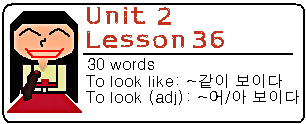 Lesson 36: In this lesson, you will learn how to use ~같이 보이다 to say that something/somebody looks like something. For example, “You look like a monkey!” The same pattern can be used to say that something smells/tastes like something. For example, “You smell like a monkey!” In addition, you will learn how to use ~어/아 보이다 to say that somebody looks like an adjective – for example “You look happy!” Lesson 36: In this lesson, you will learn how to use ~같이 보이다 to say that something/somebody looks like something. For example, “You look like a monkey!” The same pattern can be used to say that something smells/tastes like something. For example, “You smell like a monkey!” In addition, you will learn how to use ~어/아 보이다 to say that somebody looks like an adjective – for example “You look happy!”
This Lesson is also available in Español, Русский, Deutsch, 中文 and العربية |
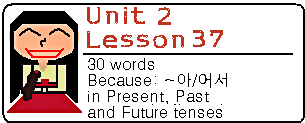 Lesson 37: In this lesson, you will learn how to add ~아/어서 to the stems of verbs/adjectives to have the meaning of “because/therefore.” In English, we just have a word for “because” but in Korean, it actually a grammatical concept. Using this concept will make your sentences much more complex and natural because you will now be able to say things like “I want to eat because I am hungry.” Lesson 37: In this lesson, you will learn how to add ~아/어서 to the stems of verbs/adjectives to have the meaning of “because/therefore.” In English, we just have a word for “because” but in Korean, it actually a grammatical concept. Using this concept will make your sentences much more complex and natural because you will now be able to say things like “I want to eat because I am hungry.”
This Lesson is also available in Español, Русский, Deutsch, 中文 and العربية |
 Lesson 38: In the previous lesson, you learned how to add ~아/어서 to words to create the meaning of “because/therefore…” In this lesson, you will learn how to create this name meaning, but using a different grammatical concept: ~기 때문에. You will learn how to apply this to future, past and present tenses, as well as how you can use 때문에 in other situations. Lesson 38: In the previous lesson, you learned how to add ~아/어서 to words to create the meaning of “because/therefore…” In this lesson, you will learn how to create this name meaning, but using a different grammatical concept: ~기 때문에. You will learn how to apply this to future, past and present tenses, as well as how you can use 때문에 in other situations.
This Lesson is also available in Español, Русский Deutsch and العربية |
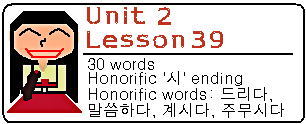 Lesson 39: In this lesson, you will learn how to add the honorific ‘시’ ending to word stems to express respect to the acting agent in a sentence. In addition, you will learn some common words that do not need this honorific ending because they themselves imply respect. Word such as: 드리다, 말씀하다, 계시다, 들다, etc… Lesson 39: In this lesson, you will learn how to add the honorific ‘시’ ending to word stems to express respect to the acting agent in a sentence. In addition, you will learn some common words that do not need this honorific ending because they themselves imply respect. Word such as: 드리다, 말씀하다, 계시다, 들다, etc…
This Lesson is also available in Español, Русский, Deutsch and العربية |
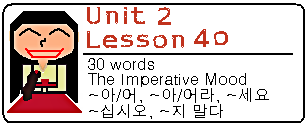 Lesson 40: In this lesson, you will learn about the imperative mood in Korean, which is a fancy way to say “giving commands.” This is one of the most important lessons we have had in a while, so study this one hard! You will learn the endings that you can use to make commands, such as ~세요, ~아/어, ~아/어라 and others with the same meaning. In addition, you will learn how to use the imperative mood in negative sentences as well, to create sentences like “Don’t go to the park!” Lesson 40: In this lesson, you will learn about the imperative mood in Korean, which is a fancy way to say “giving commands.” This is one of the most important lessons we have had in a while, so study this one hard! You will learn the endings that you can use to make commands, such as ~세요, ~아/어, ~아/어라 and others with the same meaning. In addition, you will learn how to use the imperative mood in negative sentences as well, to create sentences like “Don’t go to the park!”
This Lesson is also available in Español, Русский, Deutsch and العربية |
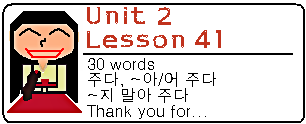 Lesson 41: In this lesson, you will learn all about the word 주다! Using what you learned from Lesson 40, you will learn how to add the imperative endings (~세요, 아/어, etc) to 주다 to tell people to give you things. You will also learn how to attach 주다 to verbs/adjectives tell people to do things using 아/어 주다. Lesson 41: In this lesson, you will learn all about the word 주다! Using what you learned from Lesson 40, you will learn how to add the imperative endings (~세요, 아/어, etc) to 주다 to tell people to give you things. You will also learn how to attach 주다 to verbs/adjectives tell people to do things using 아/어 주다.
This Lesson is also available in Español, Русский, Deutsch and العربية |
 Lessons 34 – 41 Mini-Test: Test yourself on what you learned from Lessons 34 to 41! A Mini-Test like this will be uploaded after every eight lessons. Don’t worry if the test doesn’t go so well – this website is here to help you! Lessons 34 – 41 Mini-Test: Test yourself on what you learned from Lessons 34 to 41! A Mini-Test like this will be uploaded after every eight lessons. Don’t worry if the test doesn’t go so well – this website is here to help you!
This Lesson is also available in Español, Русский, Deutsch and العربية |
| Click here to check out Unit 2: Lessons 42 – 50 |

